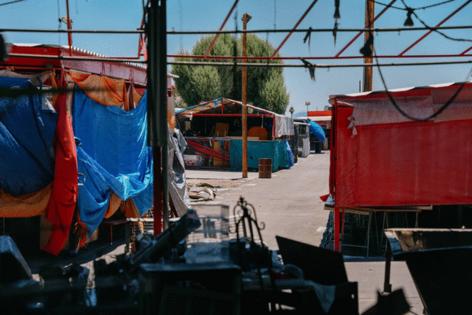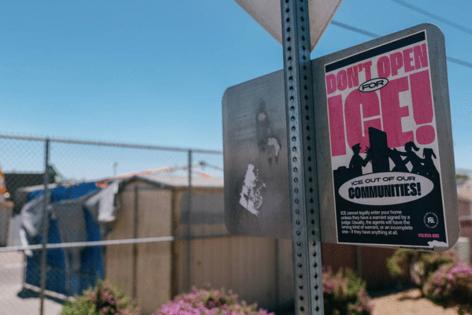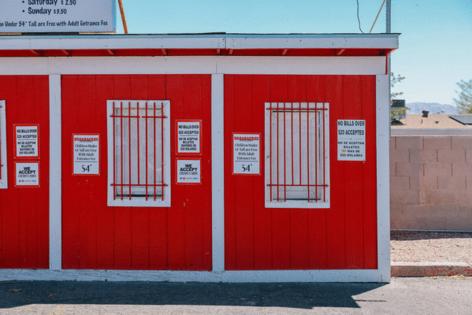'No sales; no income': Fear of ICE deportation sweeps impacting Latino businesses in Las Vegas
Published in News & Features
Fear in the local undocumented community about getting swept up by immigration agents — a sentiment cited in the indefinite closure of Broadacres Market — is reverberating in the finances of independent family-owned establishments that cater to local Latinos, according to businesses that spoke to the Las Vegas Review-Journal last week.
Traffic has badly slumped at Tutis Party Supply store, where owner Edith Arteaga has been crafting handmade piñatas and selling Mexican candy, refreshments and other goods for celebrations.
She said business was “very, very, very good” when she first took over the store in 2018, noting that it weathered the pandemic.
And while the store experienced a slowdown in 2024, Arteaga said sales have dropped about 80% since President Donald Trump retook office and implemented increased immigration enforcement under the promise of “mass deportations.”
The slump at Tutis in North Las Vegas has translated to half-empty shelves, and Arteaga has had to dip into her savings to stay afloat, she said.
“If there are no sales, there are no earnings,” Arteaga said in Spanish. “The situation right now is very difficult.”
Down the street, a married couple has cut hair at their Capelli Beauty Salon for seven years.
Construction workers who frequent the business have told them they’re scared to go out, and they don’t get haircuts as often as they used to, Grecia Jaimes said.
Business hasn’t been this bad since the pandemic, she said. Daily clientele in recent months has gone from 15 to 30 people to three or four, she said.
During a recent afternoon, there was low traffic and sporadic business activity at two Latino hubs in North Las Vegas and Las Vegas. Workers from mobile car washes, a bakery, a convenience store, a Western apparel establishment, a restaurant, and a botánica told the Review-Journal that they, too, had taken a hit.
No reopening date yet
The massive Broadacres swap meet, a staple for local Latinos since 1977, unexpectedly closed its doors on June 21, days after Border Patrol agents in camouflage and tactical gear hoisted long guns as they raided a similar market in California. The federal agency touted the raid in a flashy social media video.
Two people were arrested at the California market, according to news reports. Immigration and Customs Enforcement told the Review-Journal that its agents hadn’t gone to Broadacres before it closed.
The North Las Vegas swap meet remained closed this weekend, although it has stated it will reopen “soon.”
Elected officials and immigration advocates also have raised the alarm about the economic impact caused by an anxiety within undocumented consumers hiding in the shadows and not frequenting businesses.
“Those who are not here illegally and are not breaking other laws have nothing to fear,” wrote an unnamed senior Department of Homeland Security official in a statement to the Review-Journal. “Elected officials choosing to fearmonger by distorting reality are doing a great disservice to our country and are responsible for the 500 percent increase in assaults on ICE officers.”
The Nevada Republican Party reacted to the Broadacres closure on social media.
“If you can’t stay open without illegal aliens, you don’t deserve to be open at all,” it posted on X.
The offices of Gov. Joe Lombardo and Rep. Mark Amodei, both Republicans, did not respond to messages seeking comment.
Lombardo previously said the state will continue obeying federal laws and cooperating with immigration authorities.
“Protecting our communities from crime is vital to the small businesses that drive our state’s economy. Those who say otherwise are presenting a false choice,” Lombardo said in a statement.
‘It’s palpable’
Nevada Democrats said they’re hearing directly from business leaders.
“It’s palpable,” Clark County Commission Chair Tick Segerblom said. “Broadacres brought it to a head.”
Segerblom said officials are monitoring the immigration enforcement activity in Southern California where the Trump administration has made a show of force in recent weeks, because of its proximity to the Las Vegas Valley.
“People are just terrified, frankly,” he said, while noting, “It hasn’t gotten to where it is in L.A.”
Segerblom said the county is communicating with other elected officials to “let people know that we’re monitoring it, aware of it and we’re pushing back.”
Assemblymember Cinthia Zermeño Moore said she’s heard about immigrants’ hesitation to go out and she reported near-empty Latino-centered businesses, including grocery stores.
Mariana’s Supermarket, a chain with six locations in the valley, alluded to the fear of immigration authorities.
“We understand there have been recent concerns circulating,” the store wrote on social media earlier this month. “We want to reassure you: none of these reports involve our stores.”
Zermeño Moore also cited a recent Gold Cup soccer match the Mexican national team played at Allegiant Stadium.
Attendance was poor compared with previous Mexico games in Las Vegas, although the entire tournament played across the United States had seen about a one-third drop of fans compared with the previous iteration in 2023, according to Sports Business Journal.
The assemblymember said she heard from people who asked her if she knew whether immigration authorities would be there and whether they should carry their children’s birth certificates.
Zermeño Moore said some of them decided against going.
Nevada Sen. Fabian Doñate, D-Las Vegas, said the Broadacres closure affected hundreds of businesses.
“We are facing an economic catastrophe because of the actions of what’s being done at the local and federal level,” he said. “People of Latino descent fear stepping out of their homes, fear that they may be apprehended and not be able to defend themselves.”
Scope of ICE activity unclear
Advocates and immigration attorneys have independently confirmed instances of ICE activity in Southern Nevada, reports they then share online. But the internet is also filled with unconfirmed hearsay, which helps drive the fear.
The Department of Homeland Security hasn’t shared arrest statistics and has been mum about the scope of its operations, sidestepping media inquiries after they happen.
A spreadsheet of regional ICE arrest data, which was previously updated quarterly, hasn’t displayed any changes since Dec. 31, but The Deportation Data Project at the University of California, Berkeley, obtained state numbers through a Freedom of Information Act lawsuit.
Using that data, the New York Times reported that Nevada saw 940 ICE arrests between Jan. 20, when Trump took the oath of office, and mid-June — a 289% increase compared with the same time period in 2024 and the 11th-largest year-over-year increase in the U.S.
The Metropolitan Police Department last month entered into a 287(g) agreement with ICE at the Clark County Detention Center that allows jail personnel to serve warrants on certain inmates believed to live in the country illegally, giving agents up to 48 hours to pick them up after the certain inmates are due to be released on local charges.
The agreement mandates that Metro coordinate with ICE before releasing any data to media outlets. Prior to that, Metro declined a Review-Journal request for numbers, citing confidentiality and privacy.
Affected restaurant
Tarasco Flor De Michoacan is a family-owned eatery that has served a mostly Latino clientele for the past 15 years.
“I think everyone who owns a small business is worried,” owner Josefina Ramirez said in Spanish.
She said she noticed the slump in sales at the Mexican restaurant in March and that it’s only worsened since.
The more chatter there is of immigration enforcement, the more the restaurant has suffered, Ramirez said.
Ramirez noted that she was apolitical.
“I only see what’s really happening with our business,” she said.
Expenses keep mounting, and Ramirez fears having to shut down if prospects don’t improve.
“The landlord isn’t going to reduce the rent, the electric company isn’t going to reduce the bill and the employees still need to get paid,” she said. “The only one who loses is the business owner.”
_____
©2025 Las Vegas Review-Journal. Visit reviewjournal.com.. Distributed by Tribune Content Agency, LLC.












Comments